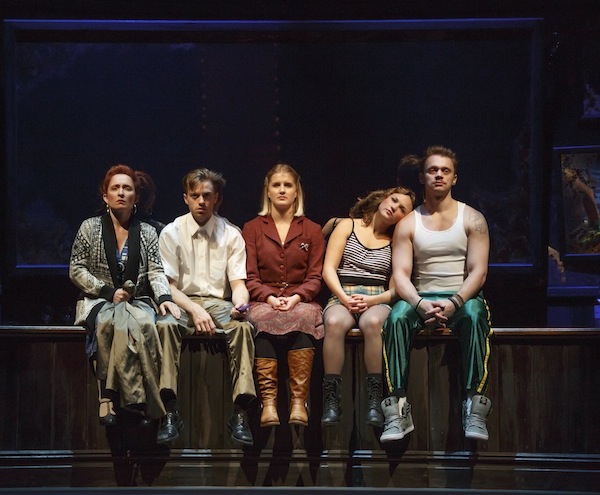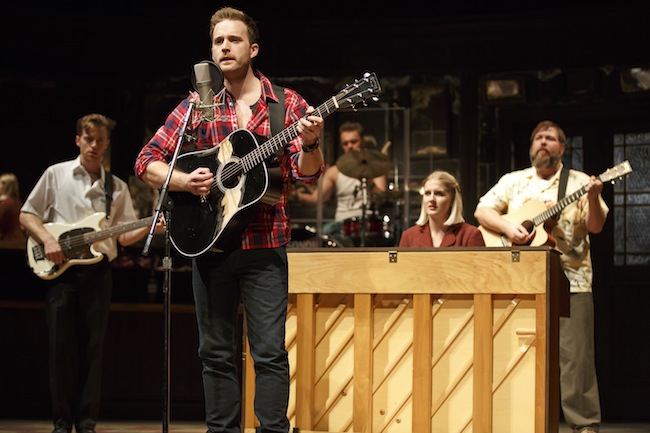Fuse Theater Review: The Musical “Once” — Music as Healing and Community
John Tiffany’s Tony-winning direction of “Once,” restaged for the current tour, is a miracle of judicious rhythmic choices and deft transitions.
Once, Music and lyrics by Glen Hansard and Marketa Irglova, book by Enda Walsh based on the motion picture written and directed by John Carney. Directed by John Tiffany. Choreography by Steven Hoggett. Presented by Broadway in Boston at the Boston Opera House, Boston, MA, through Jan. 19.
By Debra Cash
If you cherished the little-indie-movie-that-could, or have caught any of the publicity associated with the Broadway show Once, you know what this delicate romantic musical is about.
Down and out street musician and vacuum repairman Guy — yes, that’s how we know this guitar-slinging Everyman — meets piano-playing Czech émigré Girl. Through the force of her optimism, these two young people adrift in Dublin go “beyond fear” where they find themselves blessed by the “healing power of music.”
The back story of the film and musical is even better. Irish musician Glen Hansard meets a much-younger Marketa Irglova in the band The Frames; they make a movie in three weeks on two camcorders for less than $100,000 in which they co-star as versions of themselves; they fall in love promoting the film; win the 2007 Academy award for Best Song; can’t handle success (well, mostly it’s Hansard who falls apart) and split up (much of which is documented in The Swell Season). They have their film work shopped by American Repertory Theatre in the disco/bar at Oberon in Cambridge for a Broadway show that goes on to win 8 Tony awards, including the 2012 award for best musical.
The Boston audience enters the national tour’s imaginary Dublin even before we’ve shrugged off our winter coats. Before the show you can go up on stage and buy a drink in the set’s cozy pub designed by Bob Crowley and lit in appropriate atmospheric effects by Natasha Katz, its curved back wall shaped by imperfect bar mirrors. The show’s onstage musicians — a punk girl with a violin, an older redhead with an accordion, a couple of guys with beards and guitars and mandolins — play Irish standards like “The Leaving of Liverpool”; the women in the cast detour through a bit of Balkan singing. (If you saw the 2012 Woody Guthrie revue Woody Sez, you’ll recognize the spirited, informal vibe.) Once‘s cast, the onstage audience members, and those of us welcoming friends coming up the aisles with air kisses or thumbing through the programs in our seats, make a circle of participation.
The show begins in earnest when Stuart Ward as Guy is encouraged by the other musicians to step out of the ensemble. When he sings, his voice makes no disguise of his shredded heart. “Leave” sets up Guy’s predicament the way the paean to Rosaline sets up Romeo and Juliet — you know the hero’s prior loss is not going to be where the action is.
Guy and Girl (the sweet Dani De Waal) meet cute. In her slight accent she asks him “do you enjoy being Irish?” and there are some well-placed jibes about whether he — like every Irish musician of the past few decades — aspires to be Bono. But soon she’s playing him a snippet of Mendelssohn on the piano.
You see, what Guy really needs is someone who can hear — and believe in — his music. Girl supplies that audience, acting as our proxy. When the musicians in the pub start to listen to Guy by sitting with their backs to us during “Gold,” we’re literally right there behind them. (Here’s the original Broadway cast performing a slightly cut version of the number at the 2012 Tony awards.)
The completely believable Ward could be Hansard’s scruffy younger brother, full of ardent missteps. Dani De Waal’s whimsy was a bit forced for my taste, although her singing has just the right edge of vulnerability. Each of the onstage band members doubles in complementary roles, portraying the bar owner, the bank manager, the mother. John Tiffany’s Tony-winning direction, restaged for the current tour, is a miracle of judicious rhythmic choices and deft transitions.
Hansard’s most memorable singer-songwriter contributions from the film — including the Oscar earworm “Falling Slowly” — have been augmented by new contributions orchestrated in gorgeous additive layers by Martin Lowe. Just when you think the song is complete as is, another line from the mandolin or cello enriches the Irish stew.
Once may be a romance about two lonely people who change the trajectory of each other’s lives. But more fundamentally, it portrays how music can draw even the most unlikely souls into a shared and radiant community.
Debra Cash has reported, taught and lectured on dance, performing arts, design and cultural policy for print, broadcast and internet media. She regularly presents pre-concert talks, writes program notes and moderates events sponsored by World Music/CRASHarts and cultural venues throughout New England. A former Boston Globe and WBUR dance critic, she is a two-time winner of the Creative Arts Award for poetry from the Hadassah-Brandeis Institute and will return to the 2014 Bates Dance Festival as Scholar in Residence.
c 2013 Debra Cash


